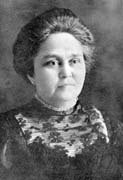Dr. Rosa Goodrich Boido

Dr. Lorenzo Boido and his wife Dr. Rosa Goodrich Boido with their children Rosalind and Lorenzo Jr. lived at 309 N. First Avenue in Phoenix in 1912. Both had received medical degrees from the prestigious Cooper Medical College now Stanford University Medical School. They practiced medicine in their Twilight Sleep Hospital at 300 E. Adams. Lorenzo Boido was born in Guaymas Sonora Mexico on June 6, 1871 and Rosa Goodrich Boido was born in Navasota Texas February 24, 1870 to Briggs Goodrich and Rosa Meador. Briggs served as Arizona Attorney General from 1887-1888 and his brother Ben represented Cochise County as a member of the Territorial Legislature in 1909. At age of fifteen Rosa's family sent her to the Pacific Methodist College in Santa Rosa California. After graduation she studied medicine at Cooper Medical and received her medical degree in1895. While attending Cooper she married a fellow student Norberto Lorenzo Boido on December 14, 1893. After Rosa completed her medical studies the couple practiced medicine in Guatemala until 1899. The Boidos returned to Arizona and lived briefly in Benson where Lorenzo homesteaded 160 acres on September 6, 1899. He served as surgeon for both the Southern Pacific Railroad and the New Mexico & Arizona Railroad. Lorenzo was issued Arizona medical license No. 457 in 1912 and Rosa No.5 in 1903. While in Tucson Rosa worked as the examining physician for the Maccabees Knights and Ladies of Security and Fraternal Brotherhood She served as president of the Pima County Suffrage Club and was a member of the Women's Christian Temperance Union. In 1912 the Boidos moved to Phoenix where they became pioneers in the use of "twilight sleep" a narcotic which helped women "lapse into forgetfulness" during childbirth. The Boidos called their hospital "Twilight Sleep". Problems in the Boidos' marriage surfaced in 1917 when Lorenzo was charged with two counts of "bastardy" and one count of "wilfully unlawfully feloniously knowingly and corruptedly" offering Judge Charles D. Wheeler two hundred dollars as a bribe to induce the judge to dismiss the bastardy proceedings. Lorenzo might have gotten nothing more than a light sentence and a fine were it not for the fact that his wife Rosa was criminally charged with producing an abortion on 15-year-old Dora Juhl. Rosa went to trial and Lorenzo fled the country. Rosa defended by W. L. Barnum and her uncle Ben Goodrich was released on bail of $15000. During the trial Judge Rawghlie C. Stanford's court room was crowded to capacity with many people standing. Carl Schlicker testified that he called upon Rosa to see what could be done when they suspected that Dora was pregnant by his brother Louis. Dora testified that during the early part of January 1918 she had gone to the Twilight Sleep Hospital told Rosa that she was pregnant and wanted an abortion. Rosa agreed to perform the abortion upon receipt of a payment of fifty dollars. Louis gave her fifty dollars but when Dora returned to the Twilight Sleep Hospital a month later Rosa told her that because the pregnancy was in an advanced state it would now cost $100 dollars. Juhl entered the hospital on February 6, 1918. She received a hypodermic injection the next morning and lapsed into unconsciousness. When Carl learned that an abortion was being performed on Dora he called the police. Officers told him to go to the Twilight Sleep Hospital and see if Dora was still there. Rosa told him that the operation was a success and Dora would go home in a few days. Carl reported his conversation with Rosa to the police who went to hospital and arrested her. When doctors examined Dora they discovered that she still carried a fetus. She was removed to St. Joseph's Hospital and on February 10 Dora expelled the fetus. Dorothy St. Clair who had charged Rosa's husband with bastardy and worked at the Twilight Sleep Hospital denied that she "wanted to get rid of the old lady". However Rosalind Bates the Boidos' daughter said she overheard a conversation in the Twilight Sleep Hospital wherein St. Clair made it clear that she meant to get rid of Rosa so that she might marry Dr. Lorenzo Boido. Ben Goodrich presented closing arguments for the defense and made it clear that even though he was 78 years old he had lost none of the eloquence which had made him famous during his practice in Tombstone. Robert Jarrett Assistant Maricopa County Attorney presented closing arguments for the prosecution. The jury deliberated for seven hours and found Rosa guilty but recommended clemency. Judge Stanford sentenced Boido to serve a term in the prison at Florence for not less than two years and not more than three years. Rosa Boido entered the Florence State prison on April 23, 1918. She was paroled on June 25, 1918. Her Arizona medical license was cancelled for unprofessional conduct on October 5, 1920 and on the same date Lorenzo's license was revoked. Rosa moved to California to live with her daughter. In 1930 California authorities revoked her California license. Lorenzo ranched near Cucurpe Sonora. Lorenzo and Rosa divorced amicably and he remarried. They remained in close contact. Lorenzo is buried near Cucurpe Sonora. Rosa Meador Goodrich Boido died on October 27, 1959 at the home of Dr. Vernon Boido her grandson at Kauai Hawaii. Rosa was cremated and her ashes were scattered along two walls of Vernon's home. The Phoenix Civic Arena now occupies land where once the Twilight Sleep Hospital stood. Sources: Who's Who in Arizona 1916; Arizona Repuiblic; Alohalani Boido family records.


